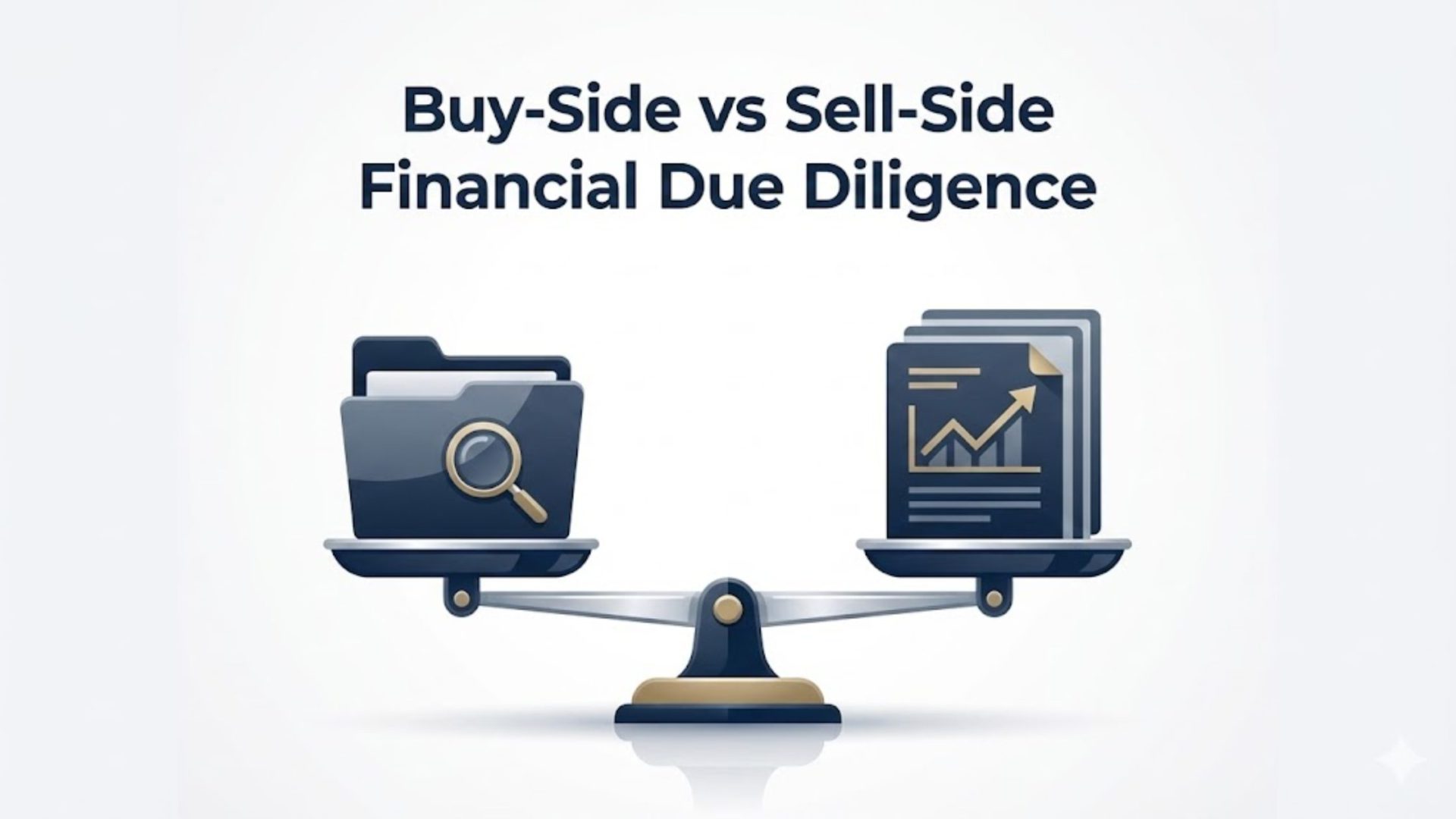The Role of Due Diligence in Mergers and Acquisitions
Published on 10/1/2025

Due Diligence: The M&A Foundation
Mergers and acquisitions (M&A) represent transformative strategies that enable businesses to expand, diversify, and gain competitive advantages. These deals, however, involve significant risks, particularly when the parties lack a deep understanding of each other’s financial, legal, and operational landscapes.
This is where the investigation process comes in—a meticulous approach to evaluating the target company’s viability, risks, and value, laying the groundwork for a successful M&A transaction. Many companies now rely on professional Financial Due Diligence Services to ensure accurate evaluation, compliance, and risk mitigation before finalizing any merger or acquisition deal.
What is Due Diligence?
Due diligence refers to the comprehensive evaluation of a target company to assess its viability, risks, and overall value. It ensures that buyers and sellers make informed decisions by thoroughly examining all relevant aspects of the business, including financial health, legal standing, and operational efficiency. This process helps identify any potential risks, such as hidden liabilities, regulatory issues, or operational inefficiencies, that could impact the transaction or post-deal integration.
Types of Due Diligence
- Financial Evaluation: Examines the financial health of the target company, including its assets, liabilities, revenue, and expenses.
- Legal Evaluation: Reviews legal matters such as contracts, compliance, intellectual property rights, and pending litigations.
- Operational Assessment: Analyzes the efficiency and scalability of the target’s operations.
- Tax Analysis: Assesses the target’s tax history, liabilities, and compliance with tax laws.
- Commercial Assessment: Evaluates market conditions, competition, and the target’s position within its industry.
Key Goals of the Evaluation Process
- Identify potential risks and liabilities.
- Validate the target company’s valuation.
- Assess compatibility with the buyer’s strategic goals.
- Ensure compliance with legal and regulatory standards.
- Evaluate the financial health and operational efficiency of the target company.
Importance of Due Diligence in Mergers and Acquisitions
This process not only protects the buyer from unforeseen challenges but also enables better decision-making by providing clarity on the target company’s strengths and weaknesses. By leveraging Financial Due Diligence Services, organizations can enhance accuracy, identify hidden risks, and ensure a smoother M&A journey.
This process not only protects the buyer from unforeseen challenges but also enables better decision-making by providing clarity on the target company’s strengths and weaknesses.
Key Benefits of Evaluation
- Mitigating Risks: Identifies financial and legal risks, preventing costly surprises post-transaction.
- Assessing True Value: Ensures the buyer pays a fair price by uncovering hidden assets or liabilities.
- Ensuring Compliance: Confirms adherence to regulatory and legal frameworks, avoiding penalties or litigation.
- Informed Decision-Making: Empowers both parties to make sound choices based on accurate and comprehensive information.
- Facilitating Smooth Integration: Identifies cultural and operational mismatches to plan effective post-merger integration.
Also Read:- Merger and Acquisition Valuation Methods: Choosing the Right Approach
Role of Due Diligence in SME IPO Advisory
While due diligence is widely associated with mergers and acquisitions, it is equally critical in SME IPO advisory, where transparency, regulatory readiness, and investor confidence are essential for a successful public listing. For small and mid-sized enterprises planning to go public, due diligence helps validate financial statements, assess legal compliance, identify operational risks, and ensure accurate disclosures in offer documents.
A structured due diligence process enables SMEs to address gaps early, strengthen governance frameworks, and align business fundamentals with market expectations. Choosing the right advisory partner is a key part of this journey, as expert guidance helps companies navigate regulatory requirements, valuation considerations, and compliance standards. Businesses evaluating this path can gain deeper insights by referring to this guide on how to choose the right IPO advisory firm in India, which outlines essential factors to consider before initiating an SME IPO.
Five Steps in the Due Diligence Process

| Step | Description |
|---|---|
| Preparation and Planning | Define the scope and objectives of the process. Assemble a multidisciplinary team of experts in finance, law, tax, and operations. Develop a checklist detailing key areas to focus on, including financials, legal, intellectual property, operations, and human resources. |
| Information Gathering | Collect and review key documents such as financial statements, contracts, employee records, and intellectual property details. Use secure platforms like Virtual Data Rooms (VDRs) for sharing sensitive information. Perform interviews with key employees and management to gain insight into the company’s operations, culture, and potential risks. |
| Risk Assessment and Analysis | Evaluate risks related to financial performance, legal compliance, and operational efficiency. Highlight areas requiring further investigation or renegotiation. Identify operational inefficiencies or issues that may affect the target company’s performance, such as outdated technology or supply chain disruptions. |
| Preparing the Report | Summarize findings with actionable recommendations. Provide a comprehensive assessment of risks and opportunities. Ensure that the report is structured in a way that is easily understandable by stakeholders, with an executive summary and detailed appendices for those requiring in-depth analysis. |
| Communication of Findings | Share results with stakeholders, including the buyer, seller, and advisory teams, to facilitate informed decision-making. Develop a post-process action plan, outlining the steps to take before closing the deal, such as renegotiating key terms, seeking additional financing, or addressing any operational issues uncovered. Offer strategic advice on how to mitigate any highlighted risks and prepare for post-transaction integration. |
Five Key Challenges in the Due Diligence Process
While this evaluation process is critical, it’s not without challenges:
- Access to Accurate Information: Incomplete or inaccurate disclosures can hinder the process.
- Time Constraints: Competitive M&A deals often require expedited due diligence, increasing the risk of oversight.
- Cross-Border M&A Challenges: Differences in legal systems, cultures, and market conditions can complicate the process.
- Evaluating Intangibles: Assessing assets like intellectual property, goodwill, and brand equity requires specialized expertise.
- Integration Planning: Identifying and addressing potential integration challenges, such as merging systems, cultures, and teams, can be difficult without a clear post-merger integration strategy.
Role of Technology in Modern Due Diligence
Technology has revolutionized the due diligence process, making it faster, more secure, and data-driven. With the growing complexity and scale of mergers and acquisitions, the reliance on manual processes is being replaced by advanced digital tools that improve efficiency, accuracy, and depth of analysis.
Technological Tools and Benefits
- Virtual Data Rooms (VDRs): Provide a secure platform for document sharing, enhancing efficiency and confidentiality.
- AI and Data Analytics: Automate data analysis, identify patterns, and uncover hidden risks or opportunities.
- Cybersecurity Measures: Protect sensitive data from breaches during the Mergers and acquisitions process.
Success and Failure Stories in M&A Due Diligence
| Case Type | Description |
|---|---|
| Success Story | A leading technology firm was in the process of acquiring a smaller startup. During due diligence, the acquirer discovered significant discrepancies between the startup’s financial projections and actual performance, including inflated sales and unreported expenses. This led to a renegotiation of the deal, reducing the purchase price and incorporating performance-based earnouts. The company saved millions by identifying the issues early, ensuring a more realistic integration plan. |
| Failure Story | A global retail company’s merger failed due to inadequate legal due diligence, which overlooked ongoing litigation at the target company. After the deal closed, the acquirer faced substantial fines and reputational damage from unresolved lawsuits. The failure to assess these legal risks led to unexpected financial burdens and regulatory complications, significantly reducing the value of the merger. |
Best Practices for Effective Due Diligence
To ensure a successful due diligence process, it’s crucial to assemble a team of experts from finance, law, tax, and operations. This comprehensive team will examine all aspects of the target company, from its financial health to its compliance status. Clear communication between the buyer and seller helps align expectations and address potential risks early in the process.
Additionally, developing a detailed checklist covering key areas like intellectual property, liabilities, and human resources ensures thorough evaluation. Setting a realistic timeline and utilizing technology, such as Virtual Data Rooms (VDRs) and data analytics, can streamline the process and enhance efficiency.
To ensure successful outcomes, businesses should adopt these best practices:
- Assemble a Multidisciplinary Team: Engage experts in finance, law, tax, and operations for comprehensive coverage.
- Prioritize Transparency: Foster open communication between parties to facilitate trust and accuracy.
- Develop a Comprehensive Checklist: Cover all aspects, from financials to operational efficiency.
- Adhere to a Clear Timeline: Set and follow a realistic timeline to avoid unnecessary delays.
Conclusion
The evaluation process is a key element in mergers and acquisitions, helping to mitigate risks, validate valuations, and ensure regulatory compliance. Without thorough evaluation, businesses risk costly mistakes, hidden liabilities, or overvaluations. A meticulous approach to evaluation lays a strong foundation for a successful transaction, helping to secure long-term value and a smoother integration. Prioritizing a detailed and well-executed evaluation process is essential to achieving a successful M&A deal.
Take the Next Step Toward a Successful
Ready to navigate the complexities of M&A with confidence? Partner with Inspirigence Advisor to ensure thorough financial evaluations, robust legal assessments, and a seamless M&A process. Contact us today to safeguard your next strategic move!
ALSO READ:- Merger and Acquisition Valuation Methods: Choosing the Right Approach


